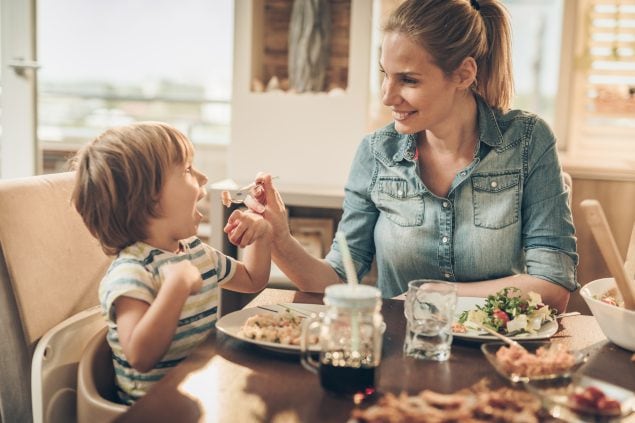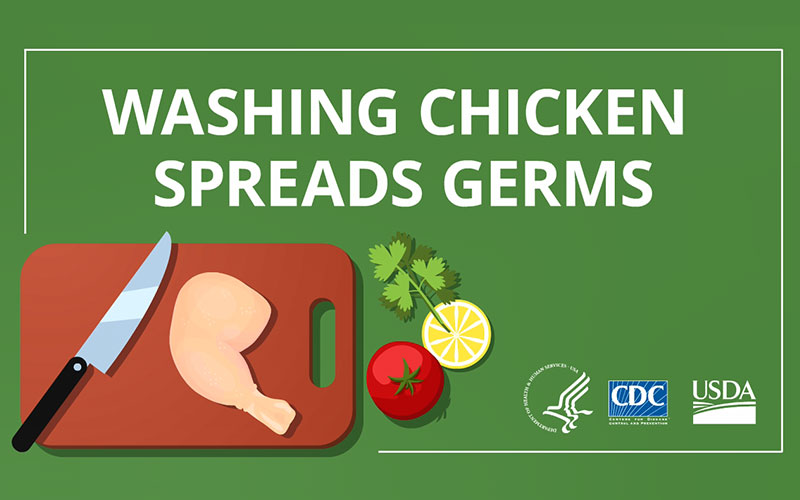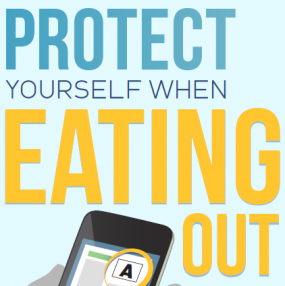10 Dangerous Food Safety Mistakes
We all want to keep our families safe and healthy. But sometimes a simple mistake in the way we handle and prepare food can lead to serious sickness. With some germs like Salmonella, just a small amount in undercooked food is enough to cause food poisoning. And just a tiny taste of food with botulism toxin can cause paralysis and even death.
You can protect your family by avoiding these common food safety mistakes.

Mistake #1: Eating risky foods if you are more likely to get food poisoning
Why It’s a Mistake: Anyone can get food poisoning. But some people are more likely to get sick and to have a more serious illness. This includes:
- Adults aged 65 and older
- Children younger than 5 years
- People who have health problems or who take medicines that lower the body’s ability to fight germs and sickness (weakened immune systems)
- Pregnant women
Solution: People who are more likely to get food poisoning should not eat the following:
- Undercooked or raw animal products (such as meat, chicken, turkey, eggs, or seafood)
- Raw or lightly cooked sprouts
- Unpasteurized (raw) milk and juices
- Soft cheese (such as queso fresco), unless it is labeled as made with pasteurized milk
Learn the best ways to protect yourself from food poisoning at home or in restaurants.
Mistake #2: Not washing your hands
Why It’s a Mistake: Germs on your hands can get on food and make it unsafe.
Solution: Wash hands the right way—for 20 seconds with soap and running water. Wash hands before, during, and after preparing food; before eating; and after using the toilet or changing a child’s diaper.
Mistake #3: Washing meat, chicken, or turkey
Why It’s a Mistake: Washing raw meat, chicken, turkey, or eggs can spread germs to your sink, countertops, and other surfaces in your kitchen. Those germs can get on other foods, like salads or fruit, and make you sick.
Solution: Don’t wash meat, chicken, turkey, or eggs. Cooking them thoroughly will kill harmful germs.
Mistake #4: Peeling fruits and vegetables without washing them first
Why It’s a Mistake: Fruits and vegetables may have germs on their peeling or skin. It’s easy to transfer those germs to the inside of fruits and vegetables when you cut or peel them.
Solution: Wash all fruits and vegetables under running water even if you’re going to peel them. Use a clean vegetable brush to scrub firm fruits and vegetables like melons, avocados, and cucumbers.
Mistake #5: Putting cooked meat back on a plate that held raw meat
Why It’s a Mistake: Germs from the raw meat can spread to the cooked meat.
Solution: Always use separate plates for raw meat and cooked meat. The same rule applies to chicken, turkey, and seafood.
Mistake #6: Not cooking meat, chicken, turkey, seafood, or eggs thoroughly
Why It’s a Mistake: Cooked food is safe only after it’s been cooked to a high enough temperature to kill germs.
Solution: Use a food thermometer to make sure you cook food to a safe internal temperature.
- 145°F for whole cuts of beef, pork, veal, and lamb (then allow the meat to rest for 3 minutes before carving or eating)
- 160°F for ground meats, such as beef and pork
- 165°F for all poultry, including ground chicken and turkey
- 165°F for leftovers and casseroles
- 145°F for fresh ham (raw)
- 145°F for seafood, or cook until flesh is opaque
Get a detailed list of foods and safe temperatures. Also, if you won’t be serving hot food right away, keep it hot (at 140°F or above) until serving.
Mistake #7: Eating raw batter or dough, including cookie dough, and other foods with uncooked eggs or uncooked flour
Why It’s a Mistake: Flour and uncooked eggs may contain Escherichia coli (E. coli), Salmonella, or other harmful bacteria.
Solution: Cook or bake flour and eggs thoroughly. Don’t eat foods that contain raw or undercooked eggs, such as runny eggs, or homemade mayonnaise, hollandaise sauce, and eggnog. Don’t eat raw (uncooked) dough or batter that contains either flour or eggs. Keep raw dough away from children, including play dough. Wash hands, work surfaces, and utensils thoroughly after contact with flour and raw dough.
Mistake #8: Tasting or smelling food to see if it’s still good
Why It’s a Mistake: You can’t taste, smell, or see the germs that cause food poisoning. Tasting only a tiny amount can make you very sick.
Solution: Check the storage times chart to see how long you can store food safely. When the time is up, throw it out.
Mistake #9: Thawing or marinating food on the counter
Why It’s a Mistake: Harmful germs can multiply very quickly at room temperature.
Solution: Thaw food safely. You can thaw it:
- In the refrigerator,
- In cold water, or
- In the microwave.
Always marinate food in the refrigerator no matter what kind of marinade you’re using.
Mistake #10: Leaving food out too long before putting it in the fridge
Why It’s a Mistake: Harmful germs can grow in perishable foods (including meat, chicken, turkey, seafood, eggs, cut fruit, cooked rice, and leftovers) if you leave them out of the refrigerator 2 hours or longer.
Solution: Put perishable foods in the refrigerator within 2 hours or within 1 hour if the food is exposed to a temperature over 90˚F (like in a hot car). Divide roasts and large portions of food, such as pots of stew or chili, into smaller containers so they will chill quickly. It’s OK to put warm or hot food into the refrigerator, as long as it’s packaged in small enough amounts that will cool quickly.























.png)












No hay comentarios:
Publicar un comentario